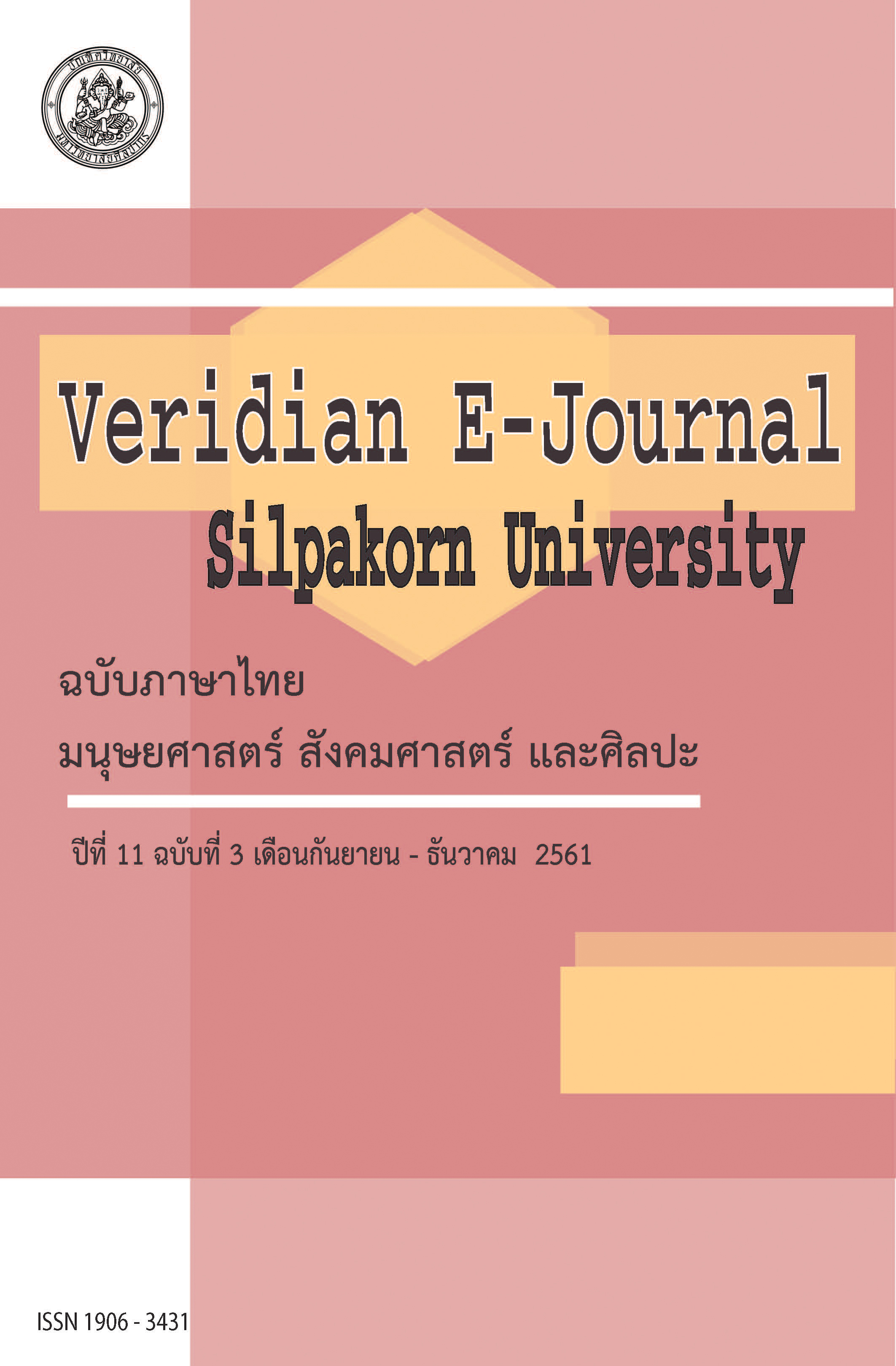ผลการจัดกิจกรรมการเรียนรู้สาระภูมิศาสตร์ โดยใช้รูปแบบการจัดการเรียนการสอนแบบจิ๊กซอว์ ที่มีต่อผลสัมฤทธิ์ทางการเรียนและทักษะการทำงานเป็นกลุ่ม ของนักเรียนชั้นมัธยมศึกษาปีที่ 3 (The Effects on the Academic Achievement and the Group Work Skills Of Matthayom Sueksa Three Students of Learning Activities in the Geography Learning Strand Using Jigsaw Instruction and Study)
Main Article Content
Abstract
การวิจัยครั้งนี้เป็นการวิจัยเชิงทดลอง โดยมีวัตถุประสงค์ (1) เพื่อเปรียบเทียบผลสัมฤทธิ์ทางการเรียนสาระที่ 5 ภูมิศาสตร์ ของนักเรียนที่ได้รับการจัดการเรียนรู้โดยใช้รูปแบบการเรียนการสอนแบบจิ๊กซอว์ กับนักเรียนที่ได้รับการจัดการเรียนการสอนแบบปกติ (2) เพื่อเปรียบเทียบทักษะการทำงานเป็นกลุ่มของนักเรียนที่ได้รับการจัดการเรียนรู้โดยใช้รูปแบบการเรียนการสอนแบบจิ๊กซอว์กับนักเรียนที่ได้รับการจัดการเรียนการสอนแบบปกติ (3) เพื่อศึกษาความพึงพอใจของนักเรียนที่มีต่อรูปแบบการจัดการเรียนการสอนแบบจิ๊กซอว์ กลุ่มตัวอย่างที่ใช้ในการวิจัยคือ นักเรียนชั้นมัธยมศึกษาปีที่ 3 โรงเรียนธรรมศาสตร์คลองหลวงวิทยาคม จังหวัดปทุมธานี ที่กำลังศึกษาในภาคเรียนที่ 1 ปีการศึกษา 2559 จำนวน 92 คน แบ่งเป็นกลุ่มทดลอง คือ นักเรียนที่ได้รับการจัดการเรียนรู้โดยใช้รูปแบบการจัดการเรียนการสอนแบบจิ๊กซอว์ จำนวน 43 คน และกลุ่มควบคุม คือ นักเรียนที่ได้รับการจัดการเรียนสอนแบบปกติ จำนวน 49 คน ซึ่งได้มาจากการสุ่มแบบกลุ่ม (Cluster Sampling) มีห้องเรียนเป็นหน่วยการสุ่ม เครื่องมือที่ใช้ในการวิจัยคือ แผนการจัดการเรียนรู้สาระที่ 5 ภูมิศาสตร์ เรื่อง ทวีปอเมริกาเหนือและทวีปอเมริกาใต้ โดยใช้รูปแบบการจัดการเรียนการสอนแบบจิ๊กซอว์ แบบวัดผลสัมฤทธิ์ทางการเรียนสาระที่ 5 ภูมิศาสตร์ เรื่องทวีปอเมริกาเหนือและทวีปอเมริกาใต้ และแบบสอบถามความพึงพอใจของนักเรียนที่มีต่อรูปแบบการจัดการเรียนการสอนแบบจิ๊กซอว์ การวิเคราะห์ข้อมูลโดยใช้สถิตค่าเฉลี่ย ส่วนเบี่ยงเบนมาตรฐาน การทดสอบหาค่า t – test dependent samples และ independent samples
ผลวิจัยพบว่า
- นักเรียนกลุ่มทดลองที่เรียนโดยใช้รูปแบบการจัดการเรียนการสอนแบบจิ๊กซอว์ มีผลสัมฤทธิ์ทางการเรียนหลังเรียนสูงกว่านักเรียนกลุ่มควบคุมที่ได้รับการจัดการเรียนการสอนแบบปกติอย่างมีนัยสำคัญทางสถิติที่ระดับ .05
- นักเรียนกลุ่มทดลองที่เรียนโดยใช้รูปแบบการจัดการเรียนการสอนแบบจิ๊กซอว์ มีทักษะการทำงานกลุ่มหลังเรียนสูงกว่านักเรียนกลุ่มควบคุมที่ได้รับการจัดการเรียนการสอนแบบปกติอย่างมีนัยสำคัญทางสถิติที่ระดับ .05
- ความพึงพอใจของนักเรียนที่มีต่อรูปแบบการจัดการเรียนการสอนแบบจิ๊กซอว์ อยู่ในระดับมากที่สุด
In this experimental research inquiry, the researcher is concerned with the effects on the academic achievement and the group work skills of selected Matthayom Sueksa Three students of learning activities in the Geography learning strand using jigsaw instruction and study. As such, the researcher compares (1) the academic achievement in the fifth learning strand of Geography of students taught by jigsaw instruction and study and those taught by traditional methods. The researcher also compares (2) the group work skills of those taught by jigsaw instruction and study and those instructed by traditional methods. Finally, furthermore, the researcher establishes (3) the level of student satisfaction with jigsaw instruction and study. The sample population consisted of 92 Matthayom Sueksa Three students enrolled at Thammasat Khlongluang Withayakhom School, Pathum Thani province who were studying in the first semester of the academic year 2016. The students were divided into an experimental group of 43 students taught through jigsaw instruction and study and a control group of 49 students by traditional methods. In selecting the members of the sample population, the researcher applied the cluster sampling method, while classrooms were used as a sampling unit.
The research instruments consisted of lesson plans for the fifth learning strand of Geography on the North and South American Continents using jigsaw instruction and study; an academic achievement test for the fifth learning strand of Geography on the North and South American continents; and a questionnaire eliciting data appertaining to student satisfaction with jigsaw instruction and study. Using techniques of descriptive statistics, the data collected were analyzed in terms of mean (M) and standard deviation (SD). The independent samples and dependent samples t-test techniques were also employed by the researcher.
Findings are as follows:
- The students in the experimental group studying by means of jigsaw instruction and study showed academic achievement after the completion of the study at a higher level than those in the control group studying through the use of traditional methods at the statistically significant level of .05.
- The students in the experimental group studying by means of jigsaw instruction and study displayed group work skills after the completion of the study at a higher level than those in the control group taught by traditional methods at the statistically significant level of .05.
- Student satisfaction with jigsaw instruction and study was found to be at the highest level.

